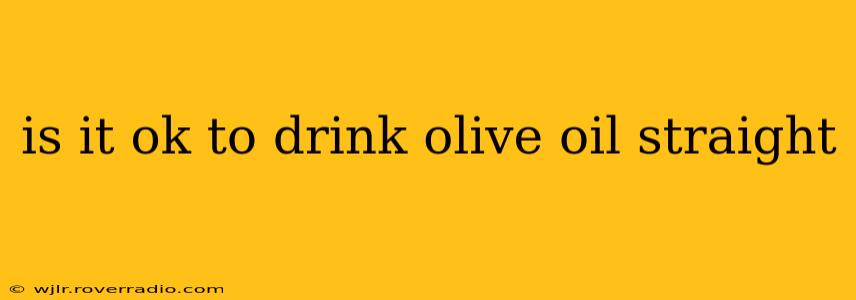Consuming olive oil straight, also known as olive oil shots, has gained popularity due to its purported health benefits. But is it actually okay, and more importantly, is it beneficial? Let's explore the facts and address some common concerns.
While generally considered safe in moderation, drinking olive oil straight isn't a practice everyone should embrace. Its taste and texture might be off-putting to many, and excessive consumption can have negative consequences. This guide will help you understand the potential benefits, risks, and best practices associated with drinking olive oil.
What are the Potential Benefits of Drinking Olive Oil?
Olive oil, particularly extra virgin olive oil, is rich in monounsaturated fatty acids, antioxidants, and other beneficial compounds. These components contribute to several potential health advantages:
-
Improved Heart Health: The monounsaturated fats in olive oil can help lower LDL ("bad") cholesterol and raise HDL ("good") cholesterol, potentially reducing the risk of heart disease. However, it's crucial to remember that olive oil is high in calories, so it shouldn't replace other healthy dietary components.
-
Anti-inflammatory Properties: Olive oil contains antioxidants like polyphenols, which possess anti-inflammatory effects. These properties may help reduce inflammation throughout the body, potentially benefiting conditions like arthritis.
-
Improved Digestion: Some people find that a small amount of olive oil can help alleviate constipation by lubricating the digestive tract. However, this should not be a replacement for proper hydration and fiber intake.
-
Potential Liver Protection: Some studies suggest olive oil may protect the liver from damage, although further research is needed.
It's important to note that many of these benefits are associated with consuming olive oil as part of a balanced diet, not necessarily drinking it straight.
Is Drinking Olive Oil Straight Harmful?
While a small amount of olive oil is unlikely to cause significant harm for most people, consuming large quantities can lead to several negative effects:
-
Gastrointestinal Distress: Drinking a substantial amount of olive oil can lead to diarrhea, nausea, vomiting, and stomach cramps. The high fat content can overwhelm your digestive system.
-
Weight Gain: Olive oil is calorie-dense. Regularly drinking large amounts can contribute to excess calorie intake and subsequent weight gain.
-
Interactions with Medications: Olive oil can interact with certain medications, so it's essential to consult your doctor before making it a regular part of your routine, especially if you take medications for cholesterol or other health conditions.
How Much Olive Oil Is Safe to Drink?
There's no definitive "safe" amount of olive oil to drink straight. Many experts suggest starting with a very small amount (e.g., a teaspoon) to gauge your tolerance and avoid any digestive upset. Listen to your body, and if you experience any discomfort, stop consuming it.
Remember, incorporating olive oil into your diet through cooking and dressings is a much healthier and more palatable way to reap its benefits than drinking it straight.
What Are the Best Types of Olive Oil to Drink?
Extra virgin olive oil is generally considered the best type for consumption, as it retains the highest concentration of antioxidants and beneficial compounds. However, even extra virgin olive oil may have a strong, pungent taste that not everyone enjoys.
Can Drinking Olive Oil Help with Constipation?
While some people report that a small amount of olive oil can help alleviate constipation due to its lubricating effect on the digestive tract, it's crucial to address the underlying cause of constipation. A balanced diet rich in fiber and sufficient hydration is far more effective long-term than occasional olive oil consumption. Consult a doctor if constipation is persistent or severe.
Does Drinking Olive Oil Help with Weight Loss?
No, drinking olive oil is not likely to help with weight loss. While it contains healthy fats, it is also high in calories. Excessive consumption could contribute to weight gain rather than weight loss. A balanced diet and regular exercise are far more effective for weight management.
In conclusion, while small amounts of olive oil are generally considered safe, drinking it straight is not a recommended practice for regular consumption. The potential benefits are often overshadowed by the risk of digestive distress and the potential for weight gain. Incorporating olive oil into your diet through cooking and dressings offers a healthier and more palatable approach to enjoying its numerous health advantages. Always consult with a healthcare professional before making significant dietary changes, especially if you have underlying health conditions or are taking medications.
